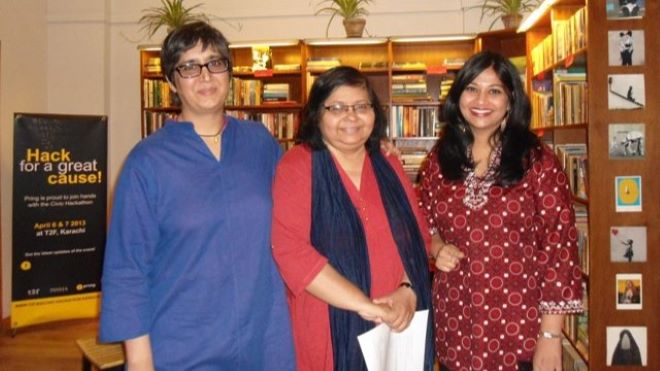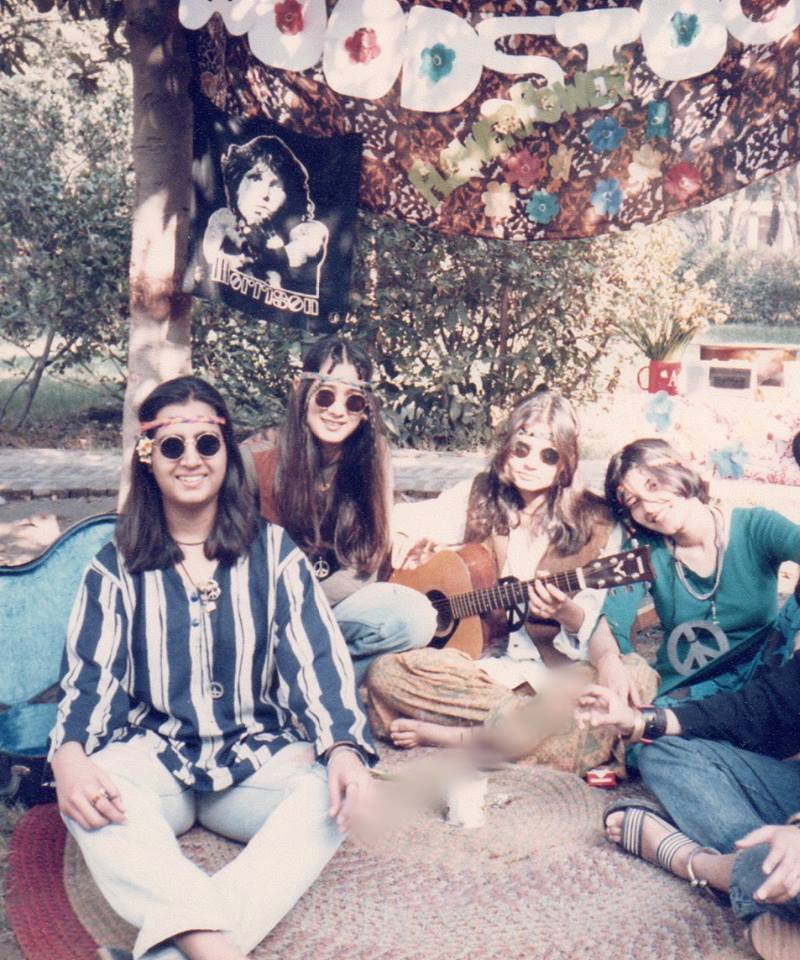
Some of you might remember that before there was a Code for Pakistan, there was the Karachi Civic Hackathon at T2F in April 2013. Sabeen was the first person to believe in and throw her support behind Code for Pakistan, without whom we likely would not exist. She inspired us every day and made the world a much better place. Here Sheba Najmi recounts Sabeen's legacy and what it means for all of us to keep that legacy of good alive.
It's been 4 long days since Sabeen's murder, yet I find myself continually reeling from disbelief of her being no more. That Sabeen Mahmud doesn't exist makes no sense. Sabeen — charming, rational, humanist, defiant, fun, witty, liberal, magnanimous, relentless, colorful, courageous, engaging, caring Sabeen, larger than life, the very best of our times, giving life to much needed, nearly extinct public activity — how could Sabeen be taken from us? What impoverished world has she left behind? How will Karachi go on breathing without its breath of fresh air?
She stayed with me in San Francisco just last month, more peaceful and happier yet than I'd perhaps ever seen her. Ab maza aa raha hai, she told me about her work and life with that disarming smile over a sunny mid-afternoon drink at an outdoor cafe. As we strolled by Dolores Park, stopping at the top of the hill to soak in the beautiful view of the city, she admitted she hadn't been moved by San Francisco much previously, but that this time round, she'd fallen in love with it. She lamented having to leave the city, jokingly asking me to keep her on my red couch in my 1-bedroom apartment and in exchange she would take all my Code for Pakistan Google Hangout meetings for me. I warned her the Hangouts are every morning and night, and she tried negotiating me down to 2 nights a week. She held court with a captive group of my friends at my birthday dinner, and my heart swelled with pride watching my friend Sabeen in her element. Truth is, she was everyone's friend and confidante the moment they met her. And while she might romanticize other cities for a getaway, she would never move away from Karachi, for she was Karachi. How do you ever fill that deep void and the cavernous, empty sadness at what you and the world have lost?
You don't. You can't ever, because there has never been one like Sabeen. What you can do is celebrate her life and her boldness, relentlessly elevate the bar like she did, enable others, heed her powerful call to action to stand up against oppression, laugh cavalierly like only someone with a satisfied conscience who follows her heart and values can, and aspire to be even just a little like her.
I had told Sabeen a few times that she was an inspiration, but I never thanked her sufficiently for what a heroic enabler she was — to me specifically, and to hundreds of others. I regret that in this clamorous world, we take all too much for granted and pause to think deeply only after the fact. Though words can't even begin to describe the person Sabeen was, every one of us who'd met her has a story of how she touched our lives. I share one of mine here in celebration of Sabeen — so I will never forget what to aspire to.
I was one of the hundreds with a vague idea to whose work and careers Sabeen gave direction, shape, and a platform. Code for Pakistan would probably not have been if it weren't for Sabeen. I first met Sabeen at T2F at the end of 2011, when I was about to start a year-long public service fellowship at Code for America in San Francisco. Her eyes sparkled as she expressed unrestrained enthusiasm for what I was embarking on. Though a stranger, she was the first person to express her complete support for my idea of a Code for Pakistan. She instructed me to focus for the next year on the Code for America fellowship, promising to get started on the project after I returned to Pakistan post-fellowship. I recall vividly the exhilaration I felt after talking with her. She so energized me, believed in my idea without wondering how it fit into her world, encouraged me, turned me into a believer, and at the same time made sure I was putting a stake in the ground by returning. When I returned to Pakistan in early 2013, I went straight to Sabeen. She went above and beyond supporting me, quietly taking care of so many details unbeknownst to me. She arranged all the logistical details of Pakistan's first civic hackathon, which we organized at short notice, offering up T2F's space, staff, equipment, photographer, videographer, editing, press, outdoor art, and her own time before, during, and after the event, free of charge. Generous to a fault, Sabeen was the rare sort of person who'd throw her love into everything she did, giving you all the resources she could muster for you to make your dream a reality, and need none of the credit for it. At the hackathon, she wanted me to talk about Code for America so as to inspire people with its examples, and she stepped in every time I asked her to, leading the brainstorming session, setting the tone for a moving, collaborative, non-competitive weekend much like her own self. She continued to be a big support thereafter, arranging for on-the-spot meetings with T2F's accountants for advice, connecting me to people, providing a shoulder whenever I needed it. Last month in San Francisco, she instructed me to spend 3 months in Pakistan this summer and suggested we do a Code for Pakistan recruiting roadshow across the country, offering that she would help me find the right person to lead the organization in Pakistan.
Sabeen did this for hundreds of people she made feel special, enabling and encouraging them behind the scenes, rendering their half-baked ideas real for them, simply because she thought what they were doing was worthwhile. But beyond being an incredible, selfless enabler, Sabeen showed us how to just do what you love and follow what excites you every day, financial comfort and conformism be damned. Make our own terms and then live and love by them," she said to a friend. Following your own compass is a lot easier said than done. She showed us how to always do good and never settle for the mediocre or the mundane. And to do it with grace, warmth, integrity, humor, and generosity. Sabeen's charisma was one of a kind — she was healthily irreverent, but never crass or dismissive. She was passionate, yet always rational, calm, collected, respectful, and open to dialogue. When it could have alleviated all of T2F's financial challenges, she refused USAID funding because it didn't sit well with her conscience. A humanist and activist, an artist, techie, music lover, and a visionary, Sabeen was the bravest, most principled, most generous, most forthright beacon of hope of our times. And she made it so fun. I find myself going back and reading her Facebook posts and chuckling at her way with words. Not only did she brighten our lives by what she did, she brightened our newsfeeds daily with her fresh humor and on-the-mark sarcasm. For someone who drew her strength from supportive emails and messages, she would have gotten a real high out of seeing all the Facebook profile photos of her forming a mosaic in her friend list.
In a world where we are all short — short with people, short on time, short on depth - Sabeen was genuinely interested in long conversations with everyone. Including reaching out to those who vilified her, inviting them to tea at T2F, having a respectful exchange of perspectives with them, and ultimately converting them to the good side. Being adamantly secular, she experienced it all, be it a Jamaat-e-Islami jalsa, or engaging the Bilawal Bhuttos and Altaf Hussains. T2F was her baby: an eclectic, safe, welcoming haven of peace, music, culture, philosophy, science, the arts, and open dialogue in Karachi — in a country like Pakistan where just creating a space for public activity is considered an act of defiance. Free of traditionalist dogma, you'd walk in and you'd forget you're in Karachi, checking at the door your anxieties about the realities of Pakistani existence to engage in conversation with other like-minded, liberal, misfit optimists. T2F's diverse staff included Hindus, devout Muslims, and nonbelievers, high school students and graying veterans alike, everyone always honorable, friendly, respectful, tolerant, and dignified. Sabeen created a haven we could all breathe a little easier in and a platform we all used for our own little projects. In our mundanely conformist lives, many of us consider ourselves lucky if we can choose jobs we don't hate. Sabeen chose as her job to create the world she — and we — would like to live in.
She was a doer who lived by her morals and values, and unlike everyone else, she truly stood up for them. Be it throwing her full support behind a rookie transgender politician, creating India-Pakistan cultural exchanges, or hosting a dangerous discussion about a marginalized province that few care about in Pakistan, Sabeen represented all that is right with this world.
And now it isn't.
Sabeen brought color to the cowered, rightward Pakistani existence, hope to thousands of resigned souls, and was a force for sheer, idealistic good. She had more values, generosity, originality, chutzpah, and life than perhaps the whole country put together. There was none like her, and yet, she was so accessible to ALL.
Karachi was so lucky to have her. To quote Shahjahan Chaudhry, "Sabeen was a fearless spirit — perhaps the bravest woman I have met in my life. If there was a cause that deserved a champion, if there was a group that needed a hero, if there was a person with a story that needed a voice – Sabeen would not just raise her hand but also stand in the sun, walk a dangerous mile, and push the cause or group or person beyond what they ever imagined."
Without a doubt, the light has gone out with Sabeen. But we owe it to her, who gave so much of herself to us all, to keep a bit of that lovely light alive in each of us. She showed us how to live: Don't conform. Follow your own compass. Stand up for good. And do it with love and impunity.
I see myself as a huge fiery comet, a shooting star. Everyone stops, points up and gasps, "Oh look at that! Then, whoosh, and I'm gone and they'll never see anything like it ever again and they won't be able to forget me – ever.
Jim Morrison

